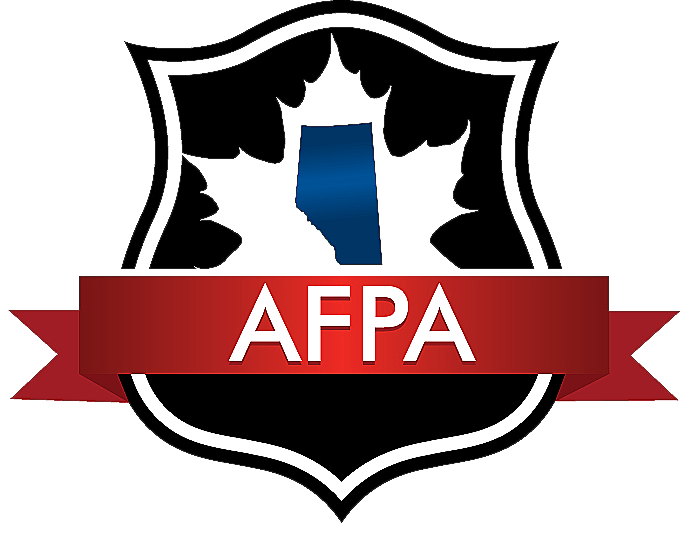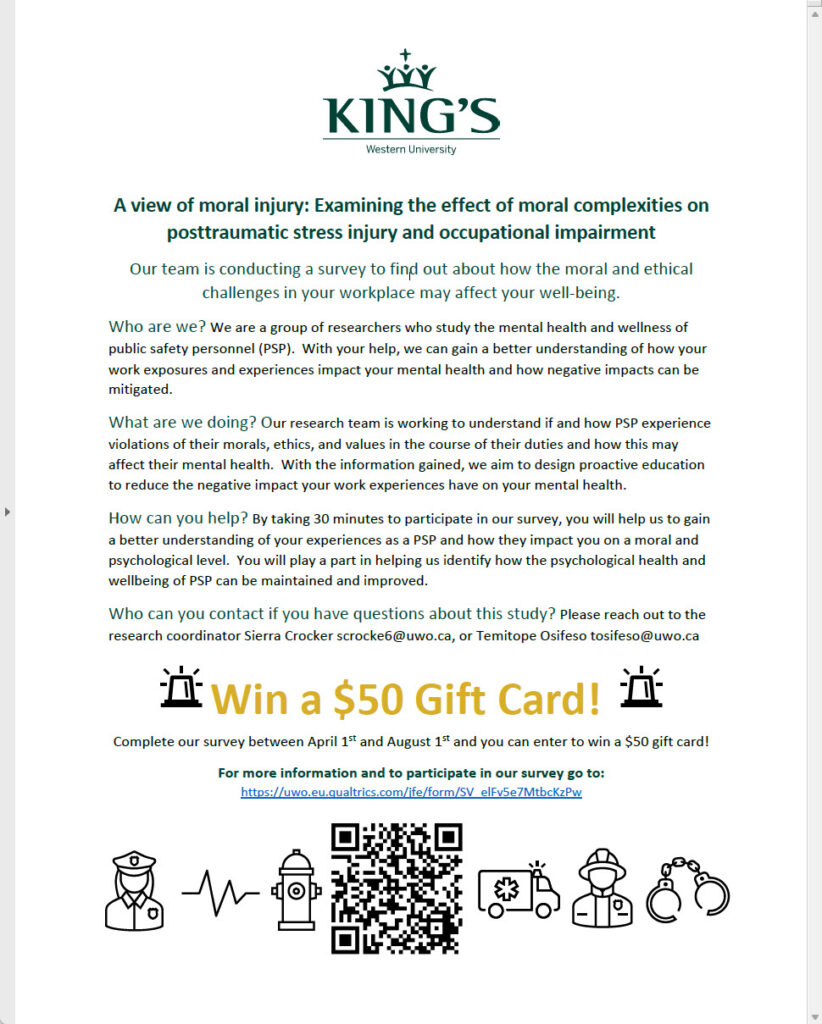A view of moral injury: Examining the effect of moral complexities on posttraumatic stress injury and occupational impairment.
Principal Investigator: Dr. David Cruise Malloy, PhD., Principal King’s University College, Western
University, King’s University College, 266 Epworth Ave, London, ON, N6H3P1,
david.malloy@kings.uwo.ca, (519) 495-0484
Co-investigator: R. Nicholas Carleton, PhD., Professor of Psychology, Department of Psychology,
University of Regina, 3737 Wascana Pkwy Regina, SK Canada S4S0A2, Nick.Carleton@uregina.ca, (306)
337-2473
Co-Investigator: Dr. Gregory Anderson PhD., Dean of Science, Faculty of Science, Thompson Rivers
University, ganderson@tru.ca, (250) 852-7137
Co-Investigator: Dr. Renee MacPhee PhD., Associate Professor, Health Science, Sir Wilfrid Laurier
University, rmacphee@wlu.ca, (519) 884-0710 x 2129
Co-Investigator: Dr. Suzette Brémault-Phillips PhD., Professor, Faculty of Rehabilitation Medicine,
University of Alberta, suzette.bremault-phillips@ualberta.ca, (780) 492-9503
Research Coordinator: Sierra Crocker, King’s University College, Western University, scrocke6@uwo.ca
Welcome, and thank you for your interest in this research study titled: A view of moral injury: Examining
the effect of moral complexities on posttraumatic stress injury and occupational impairment. To help
you make an informed decision regarding your participation in this research, we have composed this
letter to explain what the study is about, the possible risks and benefits, and your rights as a research
participant. If you do not understand something in the letter, please ask one of the investigators prior to
consenting to the study. You will be provided with a copy of the letter of information and signed consent
form if you choose to participate in the study.
Why am I being asked to participate in this study?
You are being invited to participate in this research study because you are a PSP working in Alberta. By
participating and completing an online survey as part of a research study that you will help us explore if a
construct called moral injury (MI) is relevant to your work as a public safety personnel (PSP). The
information you provide will help to inform the prevention and treatment for MI in your PSP group.
Why is this study being done?
We want to do this study because we know that PSP are regularly required to make high stakes, split second
decisions within a high-stress environment. You also work in complex, dynamic environments
where you can be simultaneously tasked with protecting, serving, and policing your own communities
for decades.
MI can occur when you make decisions or take actions in the line of duty that conflict with your
internalized values, principles, and beliefs. Actions such as discharging a firearm, injuring, or killing
another person (either intentionally or accidentally), or making an error that leads to someone being
harmed can result in an internal conflict. Sometimes MI may result from the inability to act or being
unable to do something because your proverbially “hands are tied”. Additionally, a failure to act that
results in a poor outcome can also lead to MI, even if this inaction was not deliberate.
MI can also arise when you see peers and leaders act in an unethical or unjust manner, particularly
when there is no attempt to correct or be accountable for such behaviour. When someone becomes
morally injured, they may become more likely to suffer from mental health disorders, such as major
depressive disorder (MDD), anxiety disorders, posttraumatic stress disorder (PTSD), and substance use
disorders. MI symptoms can include feelings of anger, guilt, shame and an undoing of character.
The main objective of this study is to explore if the construct of MI is relevant to PSP. This project aims
to: (1) survey PSP in Alberta to determine exposure to potentially morally injurious events; (2) identify
self-reported MI symptoms; (3) examine the relationship of MI symptomology with demographic,
occupational, and resilience-related risk or moderating factors, and; (4) inform prevention-based
programming and MI interventions in PSP contexts. The research questions are: (1) What type of events
do PSP consider to be morally injurious? (2) How are foundational constructs related to MI distributed
among and between Alberta PSP? (3) What is the relationship between MI and PSP psychological health
and occupational impairment? (4) Do symptoms related to MI differ between sex, gender, ethnicity, and
spirituality? Additionally, the study results will inform education that can be delivered to PSP and
mental health professionals with the aim of providing PSP with vital skills to help support and protect
their mental health.
How long will the survey take to complete?
You are being asked to complete an online survey that will take approximately 30 minutes to complete.
What are the study procedures?
Your participation in the study will consist of receiving a hyperlink or accessing a QR code through an
email or through the study poster that will grant you access to a secure server hosting the survey. You
will be able to complete questions at your own pace. Online access to this study will be available for
three months.
What are the risks and harms of participating in this study?
It is possible that you may be put at potential risk of triggering an unwanted emotional response to the
content of the survey. If a question makes you uncomfortable, you can choose not to answer. This
includes the demographics questionnaire. We anticipate these risks to be low. See below for more
details on voluntary participation.
What are the benefits of participating in this study?
You may not receive any benefits by participating in this study.
With this research, we hope to learn about how PSP in Alberta may be affected by MI and inform
methods that may be effective for identifying, treating, and preventing MI in PSP.
You will contribute to the development of a unique program designed specifically for PSP about MI and
contribute to knowledge used to support and protect PSP mental health.
Can participants choose to leave the study?
Your participation in this study is completely voluntary. You may decide to leave the study at any time
by exiting the online survey. Only completed questionnaires will be used. You may skip any question(s)
you prefer not to answer.
How will participants’ information be kept confidential?
The information you share will be kept confidential. This information will not be shared with anyone
outside of the research team and will not be used in the analysis, publications, or shared with your
employer. Data will be retained for a minimum of 7 years, after which they will be destroyed. Data will
be stored in an encrypted secure server held at King’s University College at Western during the data
collection and analysis stages. Only the research team will have access to study data. No identifying
information will be used in publications, or presentations based on this research, however, aggregated
demographic data will be used so you will not be able to be identified from this grouped data.
Delegated institutional representatives of King’s University College at Western or the Western University
may require access to your study-related records to monitor the conduct of the research in accordance
with regulatory requirements.
Survey results will be presented in summary form and will only reflect the overall responses of all
participants. The research team will share and discuss the results of the study at professional and
academic conferences. Results will also be published in professional journals and peer-reviewed open
access journals, and updates will be disseminated through provincial and national committees such as
the Canadian Institute for Public Safety Research and Treatment (CIPSRT).
Are participants compensated to be in this study?
You will not be paid to participate in this study.
What are the rights of participants?
Your participation in this study is voluntary. You may or may not decide to participate in the study or to
be in the study now, and then change your mind later without any repercussions.
If you decide to participate, and then later withdraw your consent, the study team will securely store
the data that we have already collected but will not collect any further personal information. Once you
submit your survey, the data will be anonymized so selective removal from the study will not be
possible.
Whom do participants contact for questions?
If you have any questions about the research now or later, please contact the research coordinator
Sierra Crocker at scrocke6@uwo.ca, or (905) 999-2953. You may also contact Dr. David Malloy at King’s
University College, Western University, at david.malloy@kings.uwo.ca or (519) 495-0484. Additionally,
you can contact the research assistant Temitope Osifeso tosifeso@uwo.ca.
If you have any questions about your role as a participant in this study or any ethical concerns or
complaints please contact Dr. Mark Yenson – Associate Academic Dean, King’s University College,
Western University, at Associate.Dean@kings.uwo.ca or 519-433-3491 x4486


